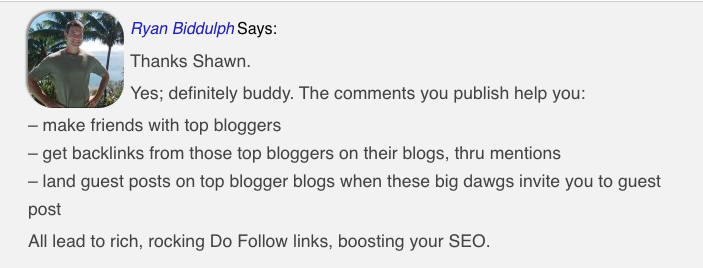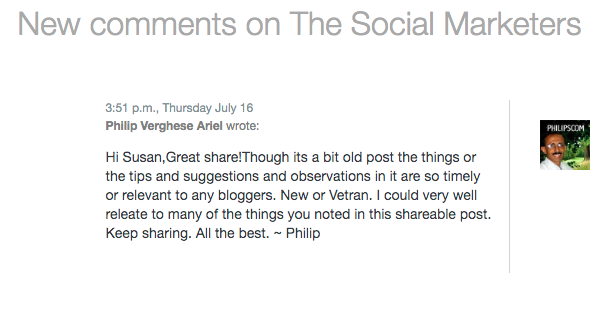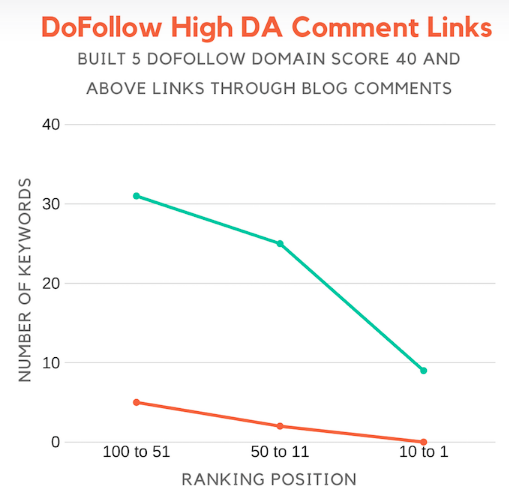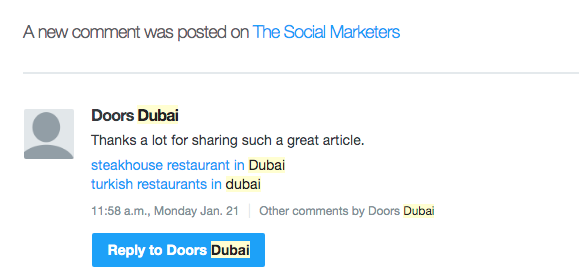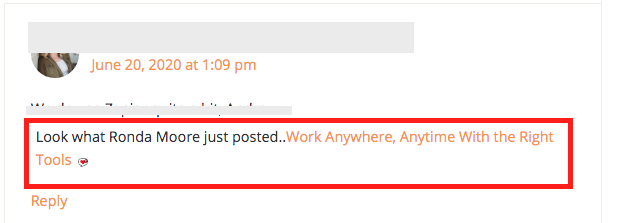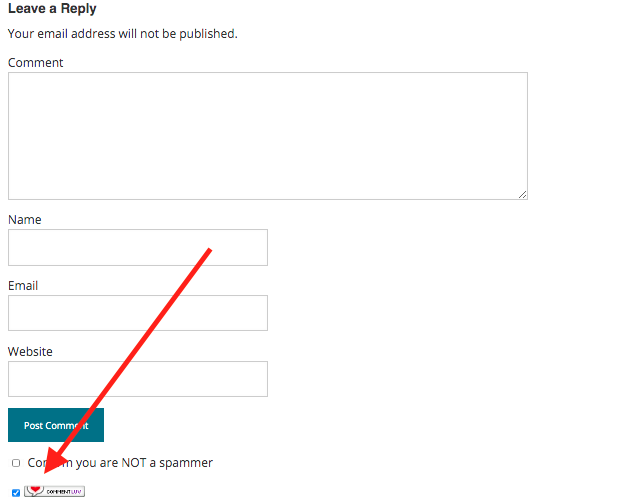Blog commenting for SEO and link building is not a new tactic. So naturally, the question comes up: is it still relevant for SEO or is it a link building tactic from the past that has at best no effect at worst can hurt your rankings? Are the backlinks from blog comments worth the effort?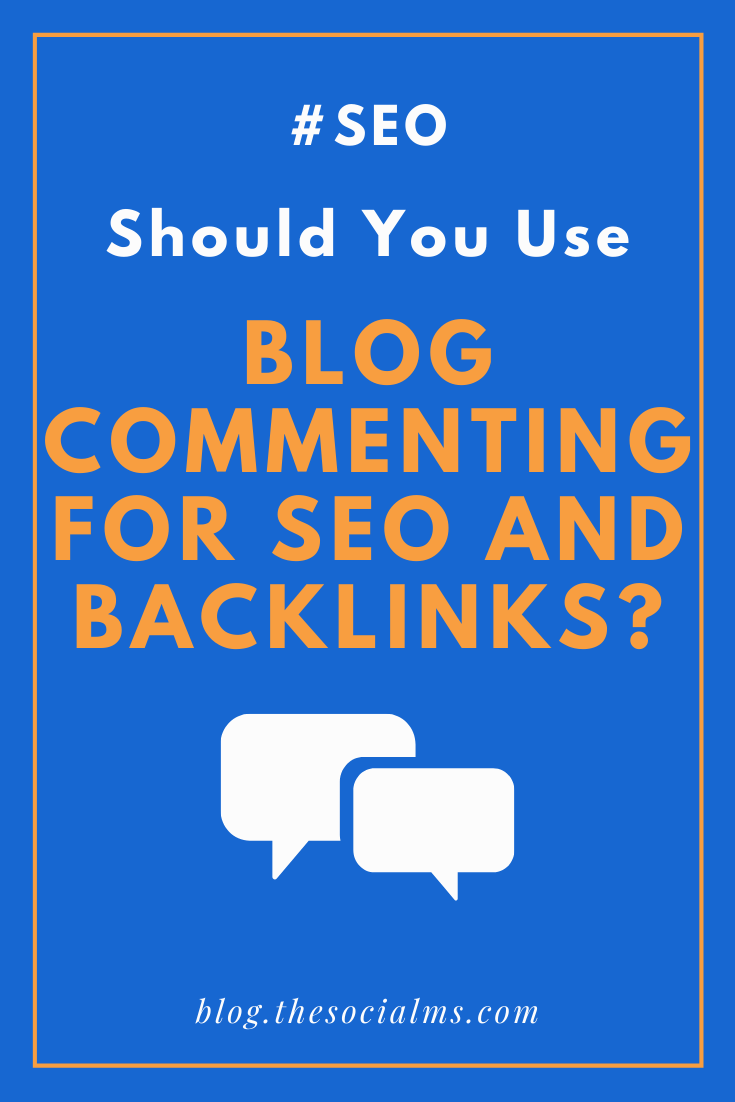
And what other benefits can you achieve through blog commenting to make it worth the time and effort that you have to invest to make it a success?
What is blog commenting for SEO?
Let’s start out by taking a look at what blog commenting as an SEO and marketing tactic means.
Basically, we are talking about commenting on blogs with a comment that includes a link back to a blog or blog post and a marketing goal in mind. In most cases, the links can either be placed in the comment itself, as a link behind the name of the blog commenter or via a WordPress plugin called CommentLuv as an added link to your most recent blog post.
Before you read on - we have various resources that show you exactly how to use social networks to gain massive traffic and leads. For instance, check out the following:
FREE Step-by-Step Twitter Marketing GuideFREE Pinterest Marketing Ebook
In this case, a blog comment has one main purpose: Get a new link back to your website.
Blog commenting is open to everyone and that made this tactic a highly popular tactic for SEO reasons.
But…
Links from blog comments are rarely earned links. That means that Google does not value these links from blog comments very high. Because you are basically setting the link yourself – it is not a link that someone else adds because they think your content is worth being linked to.
History of blog commenting for SEO
Blog comments have been used for ages to raise attention to a new blog or business. Blog commenting as a link building tactic came into fashion a couple of years back – because they were so easy to get.
Since blog commenting is so easy to do it exploded when people and especially SEO “experts” realized that these comments could give them a link and SEO power. While the original tactic asks for a thoughtful comment, the blog commenting for SEO purpose made many marketers who were looking for a quick success leave spammy comments with no value to the commented blog or the audience.
This flood of spammy comments led some bloggers to switch to no-follow links in the comments. No-follow means that the link will not pass any SEO juice to the linked domain.
Other bloggers simply deleted the commenting option on their blogs completely. Which is really a shame as it kills engagement and interaction between fellow bloggers.
Other benefits of blog commenting
There is far more to blog commenting than the SEO power they may or may not have. And that is what those spammy SEO blog commenters totally neglected.
Hey, before you read on - we have in various FREE in-depth guides on similar topics that you can download. For this post, check out:
FREE workbook: CREATE AWESOME BLOG POSTSFREE Beginner's Guide: START A BLOG
Screenshot was taken on: Blogging from Paradise
Link Building: As said, there is still a link-building effect to blog commenting. How valuable these links are and what effect you can expect from blog commenting links we will discuss later in this article.
Traffic: Although you cannot expect to get hundreds of clicks from each comment you make on a blog, there is still some traffic power in blog commenting. This effect will be bigger if you post a very thoughtful link on a related blog and ca place a link to a blog post for further reading.
Authority: If you make thoughtful comments that display some expert knowledge you can grow your authority. Again this will only work if you add a useful comment. A simple “Thank you for this great post” has no power to grow your authority.
Branding: Use your name and your blog name and your brand recognition will increase.
Business Growth: Many marketing experts and influencers started their business growth through blog commenting. You may not see these comments on just any blog – but experts and influencers interact between their blogs and comments. Or they hire people to do the commenting for them.
Networking: If you regularly comment on blogs from your niche, people will start to recognize you. If you get answers on your blog comments, stay active, and answer them. The networking power can have long-lasting effects on other parts of your business. You will have an easier time to land guest blogging opportunities if people already “know” you and you will increase your social shares as people like to share content from people they know. And you will even increase your more valuable backlinks as people like to link to blogs they know…
What makes a great blog comment – and examples of bad and useless comments
If you are not willing to invest the time and effort into your blog comments, you may rather not do it at all.
I have received numerous comments on our blog for spelling and grammar mistakes. While some of these comments are friendly and meant in good faith (thanks for them), some of these comments are just bad behavior. They don’t add value.
- Comments that clearly only have the one purpose of setting a link – they are spam or just a fragrance away from being spam.
- “Thank you for the post” comments may even be nice – but if you then add a link to your site they turn into #1 and that is spam
- No one likes the grammar police – Bloggers invest a ton of time in creating helpful content that they give to you for free. Talking them down in the comments because they missed a spelling mistake is like sitting down at dinner and down-talking the cook who just spent 3 hours trying to make a delicious meal for you.
Experienced blog commenters usually write longer blog comments that contain some useful information. They may add a fact or two to an article. Comments can open a discussion and ask questions. Comments can tell a related story. Comments can give an opinion. Comments can hint to a useful tool. Comments can relate a case study or personal experience.
Blog commenting is an art.
You need an example? Ryan Biddulph from Blogging from Paradise built his business based on guest blogging. He is totally against the spammy short blog commenting. In fact, he recommends writing blog comments of 5 – 10 paragraphs which is more than some bloggers write in their blog posts. He treats blog commenting rather similar to guest blogging: Write a purposeful and awesome piece of content for another person’s blog and audience.
The power of blog comment links
When link-building for SEO came into fashion a couple of years back, blog comments exploded. And it was not a good thing, because most comments for SEO reasons are just spam. These comments contain no information, no useful remark.
Just a short “Thank you for the article. Visit my site LINK.” Or even worse something totally unrelated just for the sake of the link – no thank you, no appreciation of the content. And there are not just a couple of these comments but hundreds and thousands of them spammed around like rainfall in November.
That is why many blogs do not allow links in comments anymore – or at least they have set their comments to “no-follow.”
However, blog comments still have some SEO power although this power is never huge as a blog comment link is always a “cheap” link.
How much power these links have strongly depends on two factors: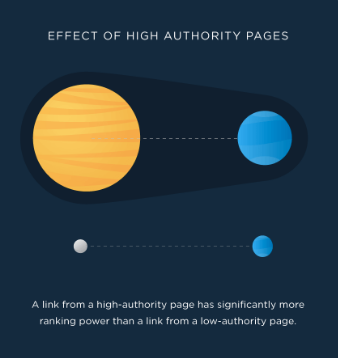
- Are the links do-follow or no-follow? Naturally, Do-follow links are what you are looking for. While No-follow links are not bad they do not have much SEO power
- The domain authority of the linking domain: The higher the domain ranks from an SEO and Google point of view the more value has a link from a comment on this blog
Image Source: Backlinko
While the links you get from blog commenting do not pass much SEO juice and they are also easy to get, these links still fulfill a purpose:
If your website is new, you need links from other websites to add to your link profile. A website that has no links more or less does not exist in the world of Google search. When you are starting out, these low-value links as much as shares from social media show Google that your blog or website does exist and some people want to find that content.
Neil Patel’s Experiment on Blog Commenting for Link Building
A while ago, Neil Patel conducted an experiment on the power of blog comments. He wanted to find out if blog commenting still had an impact on the search rankings of blog posts. Here is what he did:
- He chose English language blogs with low domain authority
- He asked participants to write a blog post of 1800 – 2000 words on any subject relevant to their website
- 30 days after publishing these posts he checked for how many keywords they ranked
- 183 websites took part in the experiment
Now all participating blogs were put into one of four groups each group now consisted of 46 (one only had 45) sites. For three of the groups he did link-building with blog comments:
- group 1: Control group, no active link building
- group 2: link building through no-follow high domain score blog comment links. 10 links for each blog post.
- group 3: link building through do-follow high domain score blog comment links. 5 links via blog comments on websites with domain score 40 or higher
- group 4: link building through do-follow low domain score blog comment links. 10 blog comment links from websites with domain score between 20 and 39
They spent a month building the links and then waited 3 more months for the full SEO power of their activity to kick in.
The experiment showed that the control group with no active link-building did rank for a couple of keywords – so creating good quality content will already help you to get more traffic from Google search.
But…
The other groups ranked for more keywords in higher positions.
The best results were achieved for group 3 which ranked for double the keywords than group 2. Group 4 ranked slightly better than group 2 but for far fewer keywords than group 3.
The conclusion of the experiment is that blog comments on high domain authority blogs with do-follow links in the comments can tremendously help you to improve your search rankings and traffic.
You can find the full study here.
Blog commenting mistakes to avoid
Whenever you leave a comment on someone else’s blog, consider how you like your comments on your blog to be. Never use any practices in the blog comments that you leave on a blog that you would not tolerate or at least not like if commenters do it to you. If you stick to that rule, you are in a good way.
The following commenting mistakes are just a hint at what you should avoid:
Use your name
You want to build your brand and reputation. If you are using a fake name or some keywords in the name section, you already identify as a spammy SEO link building commenter. Most of your comments won’t get approved if you try this.
Don’t keyword optimize your comment
I have seen comments that could have been useful and nice, but they obviously were focused so much on the link they wanted to set that the value of the comment was destroyed by keyword optimization. In fact, most blog comments with a link within the comment are regarded as spam – even more so if the link has a keyword-optimized anchor text!
Don’t use fake names or email addresses
Are you afraid to use your usual email address for your blog commenting? Then create a new one – but never use a fake email address. You want to be part of a community, so don’t hide behind fake identities.
Don’t comment on just any blog you can find – no matter the topic:
A link from just any blog is even less valuable than a link from a comment on a blog from your niche. The audience of this off-topic blog will not be interested in what you link to. And most of the time you may not be able to add much value to the blog comment. Stick to blogs from your niche!
Don’t write unrelated comments
Really, do I have to explain this? If our marketing blog gets comments asking people to click to find steakhouse in Dubai – do you even wonder why we delete that spam comment?
Don’t write spammy comments
It basically comes down to: stay real and only comment if you have something to say. Spamming will never get you real marketing results. Spamming will always hurt your marketing results – even if you may not see it instantly.
Best practices for blog commenting
To help you get the most out of your blog commenting efforts (not just for SEO) here are some best practices that will help you to achieve more success from your blog comments:
Try to be the first to comment – these comments get the most attention. Just imagine there are hundreds of comments coming in, how many do you read as a reader? The first 2 or 3? 10? But no matter how interesting the comments are, the further down your comment ends up the more readers you have already missed. And while your link may still pass on some SEO effect, you will miss out on all the other benefits of blog commenting.
Write long comments – the average blog comment is short. Most bloggers are flooded with either spammy comments that they won’t let through any way or the comments are rarely longer than one line. Now, if you submit a comment of 2 – 3 paragraphs (or 5 -10 paragraphs as recommended by Ryan Biddulph) of thoughtful knowledge that comment is going to stand out.
Personalize your comment – yes, we bloggers have an ego, too. And while I strongly resent being called by names that are not mine, showing me that you care enough to use my name in a comment already makes you stand out.
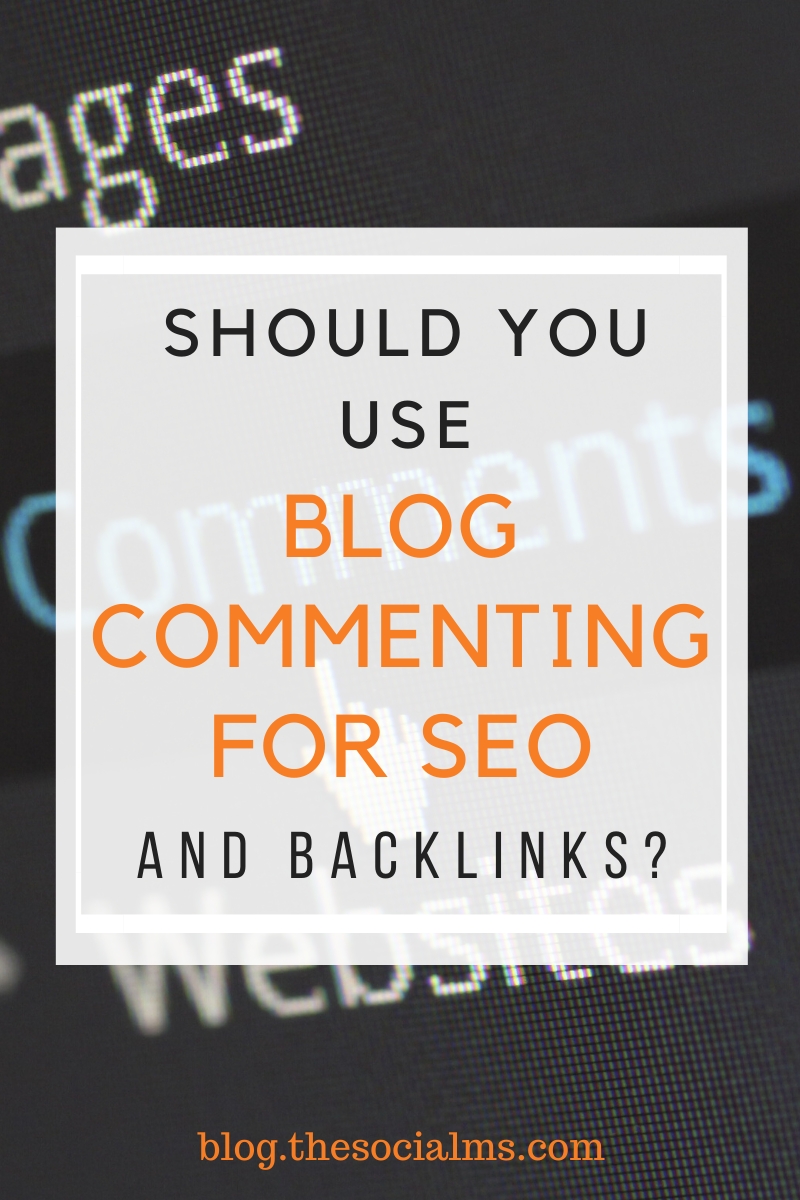
Be polite and pleasant – yes, behave like you are a guest because you are. No blogger has to tolerate being called names or down talked on a blog that’s their home.
Be positive – make a positive impact. Even if you disagree with the blog content and argue accordingly you can do so in a positive way.
Take courage – people want to hear your opinion no matter how new you are to the game or how small you feel in view of big expert names in your niche. We all want to hear your opinion and you have a right to it!
How can you find blogs that allow do-follow links in comments?
Now that we have talked so much about the benefits of blog commenting and how to do it, the one question remains: How can you find blogs that are worth commenting on?
The answer is: You can search on Google:
- search for CommentLuv or “title=”CommentLuv Enabled”” KEYPHRASE – CommentLuv is a WordPress Plugin that enables do-follow links. This is how a comment made with the CommentLuv Plugin looks:
 And this is how a comment form with a blog with the CommentLuv Plugin looks:
And this is how a comment form with a blog with the CommentLuv Plugin looks:
- Search for do-follow blogs – you will get some list of blogs that have do-follow links in their comment section
- Check out FollowList – this is a directory of blogs with do-follow links
Blog commenting can have tremendous value for your blog and business – even if the SEO value of the links you may be able to build is not so big. If your sole intention with blog commenting is SEO – you may be able to find better ways to use your time.
Are you planning on using blog comments to grow your blog and business?
Do me a favor: Leave me a comment!
Are you struggling with your SEO? Do you think you have done so much but somehow your blog traffic from Google search is stagnating? Do you need some help with setting up your blog for SEO? Are you not sure how to build links to your blog?
We have got you covered!
We created a free email course about SEO for your blog – or SEO with a blog. Join today for 4 days and 4 emails and learn about on-page SEO, Google Ranking factors, link building tactics and how to find keywords even you can rank for. Join our (free) email course about Blog SEO today!


